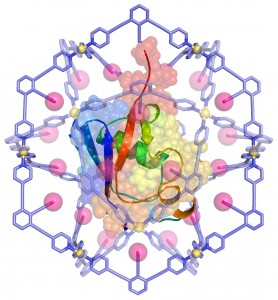Taken alive Protein captured within self-assembled capsular molecule

Researchers at the University of Tokyo’s Graduate School of Engineering have succeeded for the first time in encapsulating a whole protein in a synthetic molecular cage. Professor Makoto Fujita’s group in the Department of Applied Chemistry and Professor Koichi Kato at the Okazaki Institute for Integrative Bioscience confined a single ubiquitin molecule within a 7 nm synthetic cage.

The structure of the self-assembled, huge capsular molecule containing a whole protein and built from organic molecules and palladium ions. ©Makoto Fujita
The product has a single, precise structure, where sugar chains make an internal hydrophilic interface to hold the protein stably.
In nature, there are examples of biomolecules such as proteins or DNA being enclosed, for example within viral capsids, in which the structure or activity of the biomolecules can be controlled or they can be stored until needed. It is also known that small organic molecules can be artificially encapsulated in a hollow host molecule, within which the structure or activity of the guest molecule can be controlled. However, so far it has not been possible to enclose larger biomolecules such as proteins because it has not been possible to increase the size of precisely-structured artificial molecular capsules.
The research group created self-assembling artificial capsules simply by mixing metal ions and organic compounds in a flask, and succeeded in enclosing a protein inside that molecular cage. The capsules are formed automatically as coordination bonds link the components into a precisely-ordered structure.
Using data gathered at the SPring-8 and the High Energy Accelerator Research Organization (KEK) Photon Factory beamlines, groups lead by Graduate School of Frontier Sciences (concurrently RIKEN SPring-8 center) Professor Masaki Takata and by JASRI Group Leader Takashi Kumasaka determined the crystal structure of the complex and showed that the protein was enclosed within the artificial capsule. Further, using ultracentrifugation data, a group lead by Osaka University Associate Professor Susumu Uchiyama analyzed the molecular weight in solution and determined that the capsules preserved the protein stably even in solution.
By capturing large biomolecules in precise artificial capsules, this method permits the control of protein structure and function and should be of great use in drug development and other industrial applications. This research was published online in the British journal Nature Communications on 2 October 2012 (UK time).
Paper
Daishi Fujita, Kosuke Suzuki, Sota Sato, Maho Yagi-Utsumi, Yoshiki Yamaguchi, Nobuhiro Mizuno, Takashi Kumasaka, Masaki Takata, Masanori Noda, Susumu Uchiyama, Koichi Kato ,Makoto Fujita,
“Protein encapsulation within synthetic molecular hosts”,
Nature Communications Online Edition: 2012/10/2 (London time), doi: 10.1038/ncomms2093.
Article link
Links
Graduate School of Engineering






